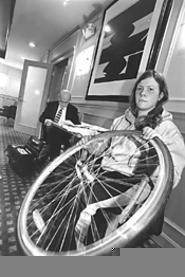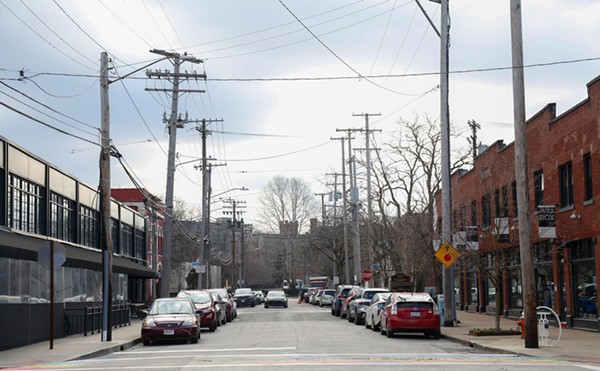The last thing their sore butts want is to sit through a long meeting in a hard-backed chair.
So they surprised themselves one recent Wednesday evening, when they actually assembled at a labor temple to discuss the possibility of unionizing. Sure, a few probably came just to thaw out their beards. But the rest seemed to be there out of real interest, if not full-blown conviction.
"I'd been toying with the idea [of unionizing] for a long time," says Taylor O'Leary, a tousled, tattooed 30-year-old messenger who's also done the job in Detroit and New Orleans. O'Leary recently got an on-the-job primer in union drives, one of the stops on his route being the offices of the AFL-CIO.
"I happened to be doing delivery there one day, and someone said, 'Hey, you guys ever thought about organizing?' A lady there promised she'd get in touch with me, and she did."
Most of the city's 21 messengers (19 men and 2 women) have spent years in their physically demanding profession, but their paychecks average only about $6-$8 an hour, say O'Leary and others. Other beefs: They are without health benefits, paid vacation, sick time, and worker's comp, and they can be fired at will. The local courier companies that employ them expect loyalty and exclusivity. Yet the messengers are considered independent contractors and slapped with twice the usual taxes.
Of course, along with the romance of not being able to pay their rent, they get to show up late, meet lots of cute office workers, and imbibe the city's heady bouquet. It's a tradeoff that's easier to make at 20 than 30, an age that most of Cleveland's messengers are pushing.
"At one time, this may have been a slacker job," says O'Leary. "It's not anymore. We're working guys. What we're trying to prove is that they can't really just go hire a bunch of crackheads to do our jobs. They tried that, and the crackheads didn't work out."
To add muscle to their organizing efforts, they've enlisted the expertise of Teamsters Local 407's Alex Adams and Lenny Kuhlenschmidt, who lead the meeting and promise the use of their legal team. Big, brawny guys with chiseled-rock faces, they sort of play Incredible Hulk to the bike messengers' swift, sinewy Spider-Man, backing up their scrappiness with brute strength.
"Youse are all here today," observes Kuhlenschmidt, a ringer for NYPD Blue's Dennis Franz. He sizes up the roomful of rubber-band bodies. "That's good. It looks like you're interested. We're interested."
He speaks of the messengers' irreplaceability, a boon to any union drive. "The doctors and lawyers -- they really need youse people. They can't just replace you on the bicycles. You provide a good service for them, so they'll sit down and bargain."
He's met with earnest gazes and knit-capped nods of approval. "I was a bag boy at Kroger 15 years ago," Chuck Hoffman, a married, 31-year-old father with two-tone hair, tells the group. "I almost made as much money then as I do now. My boss is driving a Porsche, and I'm eating ramen noodles. It's like he's the king and we're the peasants."
In San Francisco, where Hoffman once worked, bike messengers organized in 1998 under the Longshoremen and Warehouse Workers Union. Their negotiation efforts met with mixed success, with two of the major companies signing on. In Cleveland, joining the machinists' union was a possibility, but then "the various locals got together, and we decided they should go with Teamsters, because they're transportation," says Adams.
Despite their difference in stature, the Teamsters and spokesters share more than mobility. It's hard to tell who smokes more, for instance. About half the bikers nurse a two-pack-a-day habit, estimates messenger Dax Berney. Maybe it's to make up for all that fresh air and exercise.
Both groups are also known for their tattoos, which are differently manifested -- the traditional green hula girl on biceps vs. say, the yellow Lego block on the inside wrist. And for every loading-dock worker crushed by a forklift, there's a Cleveland bike messenger with 50 stitches along his scalp from a run-in with a newborn pothole.
"It's part of the job, being hurt a lot," says Hoffman, a 10-year vet with the bum knees to prove it. "There's a lot of little injuries. You'll be going 35, all of a sudden, you'll hit a grease spot, slam into the pavement. You get pretty beat up. You develop a high tolerance for pain or you don't last very long."
Getting "doored" -- hit by a car door suddenly flung open -- is a common occurrence. Some say the "best story" is that of "Double D," a guy who "got ran over, had to have a titanium rod put in his back," says Hoffman. "His company wouldn't even call the ambulance for him. They were only concerned about his packages. They wanted another messenger to finish his delivery."
Another guy, Andrew, saw his ride run over and dragged six blocks by an angry driver. A lawsuit is pending, although Andrew has since left town in pursuit of a woman. "His dad's a lawyer," Hoffman explains.
Bob Sylvester, part owner of the Reliable Runners courier company downtown, is one of the bike messengers' few friends on the management side. He says they could succeed in their union drive "if it really, really was done right and there's a strong leader.
"In the short term, it would probably hurt people like me," he admits. "But for their own benefit, I think it would help them." Local delivery firms don't make much money off of bikes, he says; rather, they use them more as goodwill ambassadors in order to get the bigger car jobs.
"When I have a good bike messenger, if he's really good, I ask him if he's got a car," because it's a much better living. "Usually, they wanna stay on the bike. They love the job and the freedom. They're kind of a different breed." And they've got the battered bodies to prove it.














